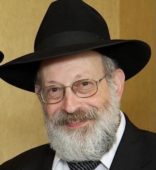NEW YORK (JTA) — Along with the new Jewish year we welcomed a new cycle of Torah readings. For Californians, the first post-Sukkot Sabbath reading was particularly timely, coming as it did a mere 10 days before the 2008 elections. It should have given pause to Jewish opponents of Proposition 8, the measure aimed at amending California’s constitution to enshrine the traditional definition of marriage in state law.
An assortment of arguments can be made in support of Proposition 8 — from the deep and abiding connection of marriage with procreation, to the healthful effects for children of having both a mother and a father, to the endangerment of religious freedom lurking in societal sanction of same-sex unions, which will all too easily be used to tar conscientious objectors as unlawful discriminators.
Such arguments aside, though, Jews with respect for their religious tradition will perceive in the first chapters of Genesis the clear template for marriage: the first man and the first woman. As the text in Genesis 2:24 declares: “Therefore shall a man leave his father and mother and cling to his wife [literally ‘his woman’] …”
In fact, the Torah, both in its written dimension (what we call the Jewish Bible) and its oral one (the “rabbinic” material that determines Jewish law), goes on to forbid the sexual union of two men. (The issue of female same-sex unions, while in a different category, is prohibited as well.)
What is more, and here more to the point, societal “officializing” of such unions — i.e. calling them “marriages” — is particularly condemned by unimpeachable and authoritative Jewish sources. They consider a society that “writes marriage documents for men” to be endangering its very existence.
A Jewish case can certainly be made for a libertarian approach to matters of personal behavior, for a “live and let live” attitude that for all its morally objectionable yield can help ensure the protection of religious and other fundamental freedoms. In any event, the behavioral issue is legally moot; the highest U.S. court has declared unconstitutional laws that criminalize homosexual acts between consenting adults.
Proposition 8, however, is not about legislating personal behavior — be it same-sex, multi-partner or incestuous, all of which have their proponents. Rather it is about preventing a twisting of the time-honored and timeless definition of marriage, a definition whose upholding the rabbis of the Talmud considered to be one of humanity’s saving graces.
We Jews as a people have a tendency toward “progressive” movements and tend to welcome all societal change as inherently healthy and good. Some such change, of course, is indeed so, and Jews can be rightly proud of having been at the forefront of social causes like racial equality and employees’ rights. But headlong rushes to a “more enlightened future” have landed some Jews in some unsavory places, like the forefront of communism in the early decades of the previous century. Or, centuries earlier, among the Hellenists of ancient Greece. Or even earlier, dancing in celebration of a golden calf.
Our pining for progress comes from a holy place, the deep and inherent Jewish desire for a perfected world. But the secret and essence of Judaism is its conviction that we are not the judges of good and bad, but rather look to the Torah for its guidance.
"We will do and [then perhaps] hear [i.e. understand],” declared our ancestors when they were given the Torah.
Our mission is not to pronounce what we mortals think is good but rather to accept the decisions of the Divine.
Much of the world considers reformulating the meaning of marriage to represent progress. Many Jews, as in past “progressive” movements, are giddily jumping on the burnished bandwagon.
Jews, though, who understand what it means to have been chosen by God to stand for holiness, which the Talmud teaches has a primary meaning of “separation from immorality,” — know that all that glistens to a liberal eye is not gold, or even good. Those Judaism-aware Jews who live in California will, against the societal tide, vote Nov. 4 to have their state retain the true meaning of marriage.
(Rabbi Avi Shafran is the director of public affairs for Agudath Israel of America.)
JTA has documented Jewish history in real-time for over a century. Keep our journalism strong by joining us in supporting independent, award-winning reporting.






